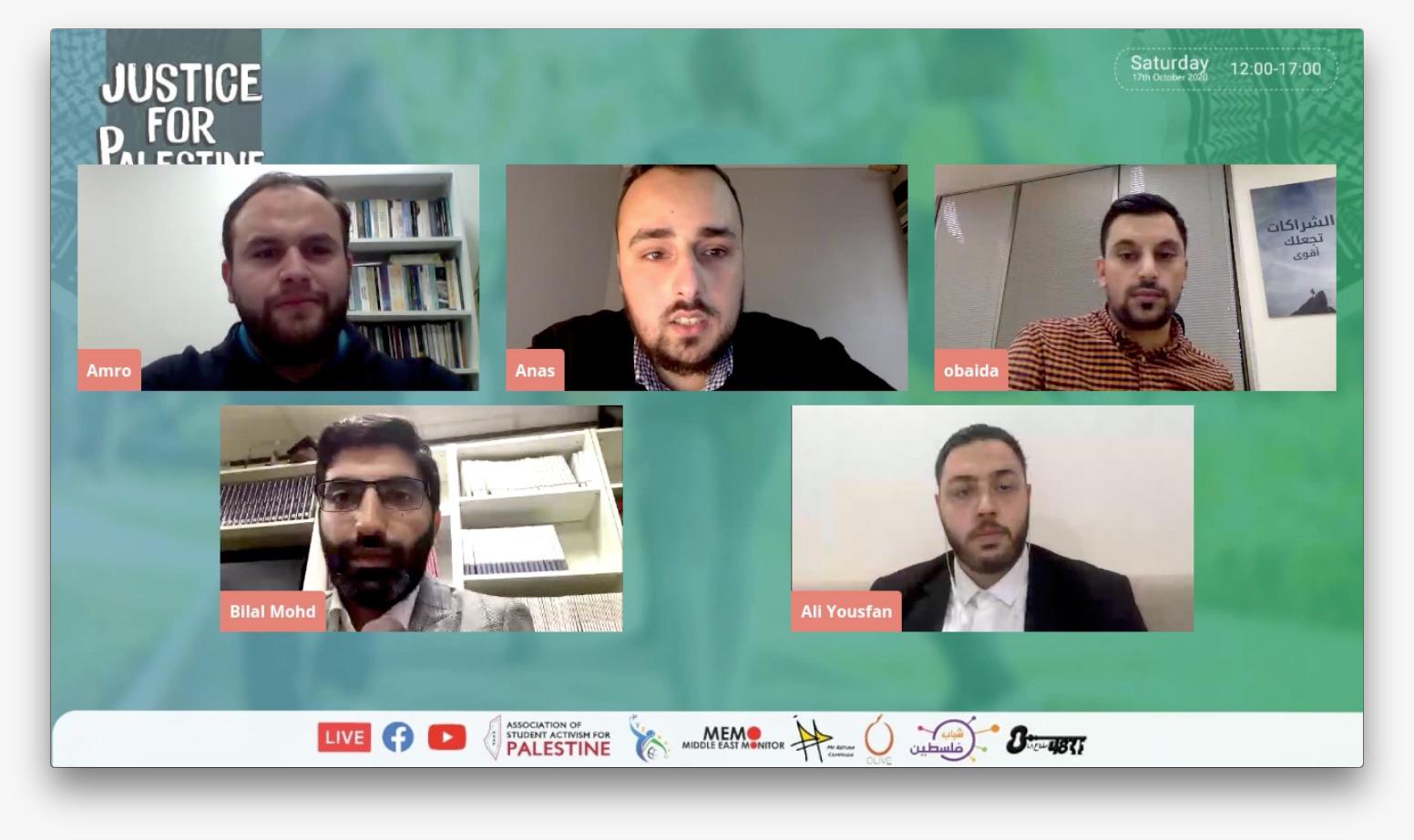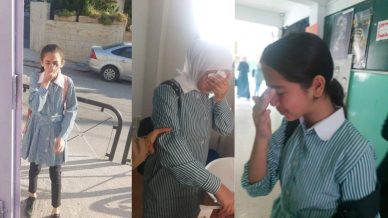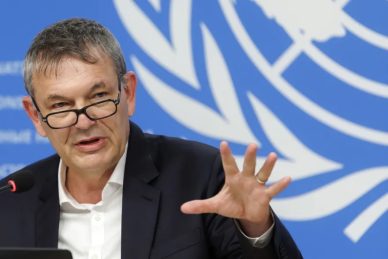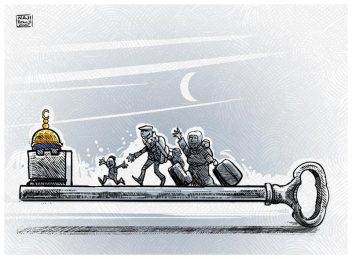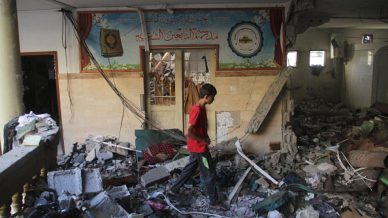Association of Student Activism for Palestine (ASAP) organised on Saturday October 17th an online student conference entitled “Justice for Palestine”. The conference aimed to empower and inspire a generation of students to connect with and raise awareness on the Palestinian cause and hence to promote action on campus to promote student activism at UK universities.
Yahya AbuSeido the president of ASAP welcomed the attendees and called for the necessity to put aside differences and divisions and to unify the students work for Palestine regardless of the different political and partisan orientations.
AbuSeido called on all new students in UK universities to join the Palestinian societies at their respective universities. He added that there was a need to work and raise awareness about the Palestinian cause among students in the British universities and more importantly the issue of refugees and the Right of Return.
The conference hosted several seminars “History of Palestine: Nakba and Right of Return” “Student activism on campus can change the world?” “BDS & Silencing Palestinian Voices” and lastly “Voices from Palestine”.
The conference hosted numerous researchers activists and experts in Palestinian affairs including Professor Ilan Pappe American activist Miko Peled Dr. Husni Hammouda and the student activist Adela Muhammad from South Africa in addition to a group of current and former members of Palestine societies in UK universities.
Professor Ilan Pappé a History professor and director of the European Center for Palestine Studies at the University of Exeter detailed the events of the Nakba and gave a comprehensive description and analysis of Israel’s ethnically cleansing of Palestine. On Israel’s settler colonial structure Ilan said “Like many settler movements they wanted new land without the indigenous people on it” He added “The world knew at real time that a crime against humanity was taking place against the Palestinians”.
Following Illan Pappé was Farrah Koutteineh from My Return campaign and the founder of key48. Farrah spoke on the reality of the refugee crisis stating that “The Palestinians are the largest and longest suffering refugees in the world”.
The second panel focused on student activism on campus. This panel discussed the key challenges of student activism today. Aida Manzano Kharman former President of Imperial College Palestine Society stated that “one of these challenges is wilful ignorance.” Kharman also noted that “another challenge is hidden agendas – People will come forward to support you but don’t have the best interest at heart to support Palestinians.”
She called on students to have more belief in themselves: “When I joined as a first year I didn’t think I could change much. I knew there was a Palestine society but didn’t think I could make it any better.” AbdiAzizi Sulaiman Former President of Sheffield Students Union said “Any event you hold is an opportunity to find more people for your committee. One of the best campaigners was found at an event.” Sulaiman’s advice to students was as follows: “If you are in the UK and are at a British university you should be seeking to change the British government’s foreign policy position.”
The third panellist Aadila Mahomed a law and humanities student in South Africa and the founder of the Stellenbosch University Palestinian Solidarity Forum and member of the BDS South Africa Coalition said: “The Youth of South Africa were so vital in the struggle against Apartheid.”
Drawing a comparison between Apartheid South Africa and the Palestinian movement she said the following: “The South African student organization was established and continued gathering support from campus to campus educating people on what the inequality was that they were facing. The Palestinian people are not going to go away. Political realities are being changed by the people of the world everywhere particularly with students. Palestinians will be steadfast and the soul of the humanitarian world will continue to be with them.”
On an optimistic note Miko Peled author writer and human rights activist added that “the uncompromising determination of many of you in this conference is really the way to go we need to do more of this explaining and campaigning for the right of return and against the occupation.”
He addressed the importance of ideology in activism: “Opposing Zionism is opposing racism; Zionism is a political ideology that is racist and violent. They are not pretending that they care about the rights of the Palestinians.”
“Justice must prevail and a free Palestine must become a reality” Miko said.
Similarly to Aida Manzano Kharman the panellist Nasim Ahmed (political analyst at MEMO) spoke about the challenges faced by supporting the Palestinians in his talk he used the targeting of Black Lives Matter as an example: “Black Lives Matter has become a target for Israeli groups for their support of Palestinian human rights”. Later he added that: “Complaints typically claim that universities failed to protect Jewish students by not cracking down on pro-Palestinian activism in other words stop events that Jewish students found threatening to their identity”.
The final panel described the issue of education in relation to the Palestinian cause the panel had speakers to address the situation in Lebanon Gaza and the West Bank. Obaida Elmodallal President of Palestinian European Youth Union said: “For over 12 years the people of Gaza have lived under an Israeli imposed blockade that severely limits travel trade and everyday life for its 2 million residents and the blockade was first imposed on Gaza in 2006″. On the direness of Gaza’s situation he gave this succinct and damning summary: “
The impact of the blockade [on Gaza] has been devastating. Today Palestinians in Gaza don’t have access to clean water electricity and any other services”.
Bilal Mohd Palestinian Researcher contributed to the mosaic of difficulties that Palestinian students faced he drew a contrast between the West Bank and Gaza: “while university students in the West Bank find that they must pass through hundreds of checkpoints their colleagues in Gaza are unable to reach their sites of education due to lack of fuel”. Additional to painting a full picture of the difficulties Palestinian students face he revealed some stark truths: “To this day Palestinian children in Israeli prisons are still deprived of their right to education”.
Ali Yousfan Mobadara Palestinian Youth said: “the number of Palestinian refugees in Lebanon is now 175000”. Most crucially he described the harsh and unforgiving situation for Palestinian refugees residing there: “In Lebanon they are making it difficult for the Palestinian students that wish to enrol in public schools”. To illustrate the urgency of the issue he emphasised that “education is our last tool as Palestinians living abroad”.
Adding further flesh to Yousfan’s sentiments Amro Naief from Association of Student Activism for Palestine and the panel’s final speaker described the sheer importance of education: “throughout all of Palestinian history education has been a site of political struggle against occupation and oppression from student led strikes to the development of Palestinian universities education system particularly higher education”. In a statement echoing Yousfan’s Naief stated: “Palestinians have identified education as a useful tool in their liberation struggle”.
The Association of Student Activism for Palestine (ASAP) is a student-led organization with a vision of guiding supporting mobilizing and strengthening the relationship between pro-Palestine activist student groups and societies across the UK.

